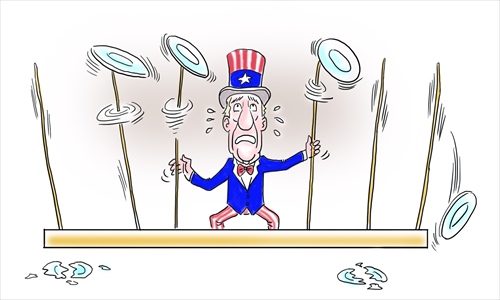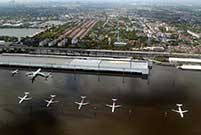


Illustration: Liu Rui/GT
US Secretary of State John Kerry visited Russia last week. After meeting Russian President Vladimir Putin in May, Kerry intended to prepare for the deliberation of the Syrian issue by the UN Security Council and the January negotiations among the parties involved in Syria in this trip. When it comes to Syria, the US has to find some agreement with Russia.
What's noteworthy during Kerry's trip is his remarks during meetings with Russian leaders. First of all, Washington has relaxed its stance and admitted the important role of the government of Syrian President Bashar al-Assad in peacefully resolving the Syria issue. "The US and our partners are not seeking so-called 'regime change,'" Kerry said, noting that "Syrians will be making decisions for the future of Syria." The language sounds neutral and fair, but in the context of the Syrian regime having an overwhelming advantage, Kerry actually means that Washington approves the position of the Assad regime, although he expressly denied this to reporters.
In 2011 when the Islamic State (IS) hadn't yet emerged, the civil war broke out between Syrian government forces and rebels. The US and other Western countries accused Assad of atrocities and purges, and hence refused to recognize the legitimacy of the regime. They considered the priority of the Syrian peace process to be isolating the Assad regime and conducting dialogues directly with Syrian rebels. If it were not for Russia's firm support, the Assad government may have collapsed three years ago. Even when the rise of the IS has posed threats to the security in the Middle East this year, the divergences between the US and Russia in fighting the IS still rest on the departure of the Assad regime.
What prompted Washington to adjust its stance on Syria is the expansion of the IS that has exceeded the control of the US and other Western countries. Western politicians worry that the IS will fragment Syria and turn it into another Afghanistan, leading to catastrophe. During the four-year civil war, the Assad government didn't collapse as the government of former Libyan president Muammar Gaddafi did. Instead Assad's grip on power has been reinforced by the power redistribution.
Syria is Russia's strategic ally in the Middle East and a gateway for Russia to the Eastern Mediterranean. The Syrian port of Tartus is the only military base of the Soviet Union remained in the Middle East and Russia's only overseas naval base. Given the essential strategic interests in Syria, Russia has no other choice but to try hard to save face when the West has attempted to squeeze its strategic space.
Russia's considerable support for the Assad regime has been a loud slap against the US policy on Syria. And backed by Russia, Assad's efforts to stabilize the situation in Syria would build up his prestige and curb Washington's policy on Syria.
Washington's attempts to isolate the Assad government have been a negative asset for the US in playing the role of major power in Syria and competing with Russia. The stern US stance has pushed the Syrian regime to the side of Russia for survival. Whether for solving the Syrian issue or limiting Russia's influence on Syrian government, the US has to give up isolating the Assad regime right now.
Kerry's two trips to Russia this year focused on the Ukrainian crisis and the Syrian peace process, which apparently shows that Washington intends to change its isolation policy. In fact, the two trips by the US secretary of state suggest that the West's isolation of Russia is ending.
After the Ukraine crisis, the relationship between Russia and Western countries plunged to the lowest point since the end of Cold War. Russia was kicked out of the G8. Its celebrations of the 70th anniversary of victory in WWII were boycotted by Western countries, which made Russians furious.
However, the West's stance on Russian isolation began to falter in recent months. Despite the lack of national strength compared to Soviet days, Russia still has broad influence in some areas. Western countries are unable to bypass Russia in addressing the Syrian issue and combating terrorism. Moreover, European countries are unlikely to completely sever their ties with Russia given their traditional economic connections.
US expert on Russia Angela Stent recently wrote in an article in Foreign Affairs that isolating Russia cannot continue and the US has to "find a way to deal with" Russia being a player in the Syrian crisis. Otherwise, no progress would be made over the US policy on Russia and the Syrian issue in the last year of President Barack Obama's tenure.
 Are these the world’s scariest landing strips?
Are these the world’s scariest landing strips? In pics: Left behind children in China
In pics: Left behind children in China Eight modern day engineering marvels of China
Eight modern day engineering marvels of China Chinese beauty with sexiest bottom
Chinese beauty with sexiest bottom Charming female bodybuilders of Chengdu University
Charming female bodybuilders of Chengdu University Polish sports stars strip off for risqué calendar
Polish sports stars strip off for risqué calendar Spectacular aerial photos of the Three Gorges
Spectacular aerial photos of the Three Gorges Contestants of Mrs. Globe pose for photo in Shenzhen
Contestants of Mrs. Globe pose for photo in Shenzhen
 Bikini models attend hot pot banquet in Hefei
Bikini models attend hot pot banquet in Hefei Top 20 hottest women in the world in 2014
Top 20 hottest women in the world in 2014 Top 10 hardest languages to learn
Top 10 hardest languages to learn 10 Chinese female stars with most beautiful faces
10 Chinese female stars with most beautiful faces China’s Top 10 Unique Bridges, Highways and Roads
China’s Top 10 Unique Bridges, Highways and Roads Reincarnation rip-off
Reincarnation rip-off Share a cab, share a bed
Share a cab, share a bed A shivery season for start-ups
A shivery season for start-ups 2015 Finding Humanity in Tragedy
2015 Finding Humanity in TragedyDay|Week